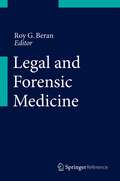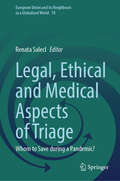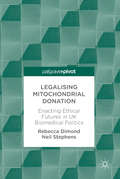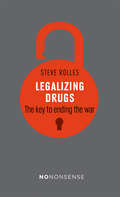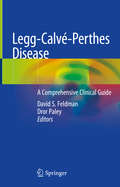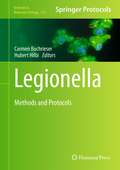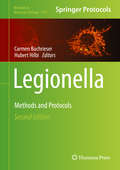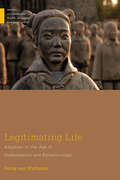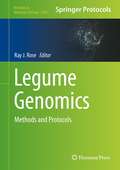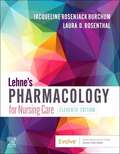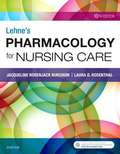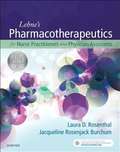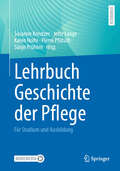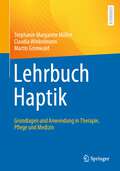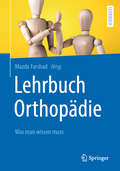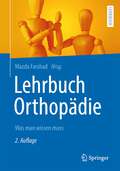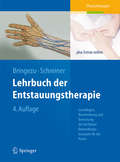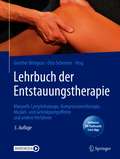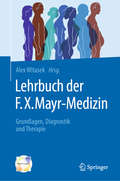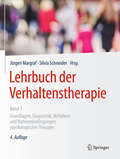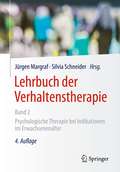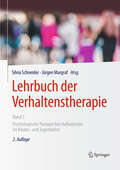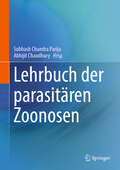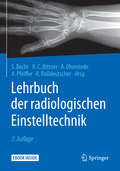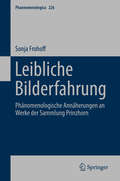- Table View
- List View
Legal and Forensic Medicine
by Roy G BeranThis is a comprehensive reference text that examines the current state of Legal Medicine, which encompasses Forensic Medicine, in the 21st century. It examines the scope of both legal and forensic medicine, its application and study and has adopted a wide ranging approach including multinational authorship. It reviews the differences between and similarities of forensic and legal medicine, the need for academic qualification, the applications to many and varied fields including international aid, military medicine, health law and the application of medical knowledge to both criminal law and tort/civil law, sports medicine and law, gender and age related factors from obstetrics through to geriatrics and palliative care as well as cultural differences exploring the Christian/Judeo approach compared with that within Islamic cultures, Buddhism and Hinduism. The book will look at practical applications of legal medicine within various international and intercultural frameworks. This will be a seminal authoritative text in legal and forensic medicine. It has a multi-author and multinational approach which will cross national boundaries. There is a great interest in the development of health law and legal medicine institutes around the world and this text will come in on the ground floor of this burgeoning discipline and will provide the foundation text for many courses, both undergraduate and postgraduate. It will define the place of legal medicine as a specialized discipline.
Legal, Ethical and Medical Aspects of Triage: Whom to Save during a Pandemic? (European Union and its Neighbours in a Globalized World #18)
by Renata SaleclTriage decision-making during a pandemic is linked to complex ethical, medical, and legal dilemmas, which in the past have been discussed mainly based on hypothetical scenarios. The crisis caused by Covid-19 has shown these dilemmas to be very real, and many countries faced significant health care challenges during the pandemic. The book presents different views on the problems of triage during the time of Covid-19 and to shed a light on how various countries approached triage during the pandemic. The absence of staff and resources in many countries opened a discussion of whether they should strive for the most egalitarian way of deciding whom to help with limited resources or to act in a utilitarian manner and establish a triage system based on saving as many people as possible. There were so-called conflicts of duty in many parts of the world, and decision-makers who had to choose which patients would survive in the absence of resources were under tremendous pressure. This book presents different views on the issue of such decision-making from legal, ethical, and medical points of view. The authors explain the origin of the concept of triage and its use in modern medicine. They point out the distinction between triage and the allocation of resources while also analysing how pandemic triage differs from emergency and disaster triage.
Legalising Mitochondrial Donation: Enacting Ethical Futures In Uk Biomedical Politics
by Rebecca Dimond Neil StephensIn 2015 the UK became the first country in the world to legalise mitochondrial donation, a controversial germ line reproductive technology to prevent the transmission of mitochondrial disease. Dimond and Stephens track the intense period of scientific and ethical review, public consultation and parliamentary debates preceeding the decision. They draw on stakeholder accounts and public documents to explore how patients, professionals, institutions and publics mobilised within ‘for’ and ‘against’ clusters, engaging in extensive promissory, emotional, bureaucratic, ethical, embodied and clinical labour to justify competing visions of an ethical future. They describe how this decision is the latest iteration of a UK sociotechnical imaginary in which the further liberalization of human embryo research and use is rendered legitimate and ethical through modes of consultation and permissive but strictly regulated licensing. Overall, this book presents a timely, multi-dimensional, and sociological account of a globally significant landmark in the history of human genetics, and will be relevant to those with an interest in genetics, Science, Technology and Society, the sociology of medicine, reproductive technology, and public policy debate.
Legalizing Drugs: The key to ending the war (No-Nonsense Guides #3)
by Steve RollesThe question is no longer if we should end the war on drugs but how we do it. This No-Nonsense Guide counts the human and financial cost of fifty years of drug war – and proceeds to outline a better way, looking at where drug law reform is already working, how to overcome the obstacles to reform, and what a post-drug war world might look like.
Legg-Calvé-Perthes Disease: A Comprehensive Clinical Guide
by David S. Feldman Dror PaleyLegg-Calvé-Perthes Disease (LCPD) remains a challenging hip condition to treat. More than a century after its identification, the etiology of LCPD remains unclear and treatment continues to be controversial. The main goal of treatment is to prevent femoral head deformation. Preservation of femoral head sphericity is known to minimize the risk of premature hip pain, stiffness and arthritis. The best ways to achieve these goals remain elusive. This book is replete with up-to-date discussions of history, epidemiology, radiology and classification systems for LCPD. It takes a well-balanced, evidence-based approach to various methods of treatment, from conventional containment femoral and pelvic surgery, to more cutting-edge procedures such as transfemoral head-neck tunneling, hip distraction, hip arthroscopy and intraarticular femoral head reshaping osteotomies, ending with a discussion of the latest biologic and pharmacologic treatment strategies. It is a well-illustrated tome for the various surgical techniques presented. The chapter authors, all experts in LCPD, share their practical, innovative and comprehensive approach to this challenging condition. Legg-Calvé-Perthes Disease will be the definitive reference work on this condition for many years to come.
Legionella
by Carmen Buchrieser Hubert HilbiThis Methods in Molecular BiologyTM series book presents methods specifically adapted and developed for the study of distinct features of L. pneumophila. Includes materials lists, reproducible protocols, and notes on troubleshooting and pitfalls.
Legionella: Methods and Protocols (Methods in Molecular Biology #1921)
by Carmen Buchrieser Hubert HilbiThe methods described in the second edition on Legionella are for the study of distinct features of L. pneumophila. Chapters guide readers through ecology and physiology of legionella, legionella genetics, cellular microbiology of legionella, biochemical assays to study legionella effectors and enzymes, immunity and host response against legionella, metagenomics, proteomics, and host microbiomes of legionella. Written in the highly successful Methods in Molecular Biology series format, chapters include introductions to their respective topics, lists of the necessary materials and reagents, step-by-step, readily reproducible laboratory protocols, and tips on troubleshooting and avoiding known pitfalls.Authoritative and cutting-edge, Legionella: Methods and Protocols, Second Edition aims to be useful for scientists studying Legionella, and for a broader research community interested in the ecology, physiology, pathogenesis, immunity, genetics and evolution of other bacterial pathogens.
Legitimating Life: Adoption in the Age of Globalization and Biotechnology (Medical Anthropology)
by Sonja van WichelenThe phenomenon of transnational adoption is changing in the age of globalization and biotechnology. In Legitimating Life, Sonja van Wichelen boldly describes how contemporary justifications of cross-border adoption navigate between child welfare, humanitarianism, family making, capitalism, science, and health. Focusing on contemporary institutional practices of adoption in the United States and the Netherlands, she traces how professionals, bureaucrats, lawyers, politicians, social workers, and experts legitimate a practice that became progressively controversial. Throughout the past few decades transnational adoption transformed from a humanitarian response to a means of making family. In this new manifestation, life becomes necessarily economized. While push and pull factors, demand and supply dynamics, and competition between agencies set the stage for the globalization of adoption, international conventions, scientific knowledge, and the language of human rights universalized the phenomenon. Van Wichelen argues that such technoscientific legitimations of a globalizing practice are rearticulating colonial logics of race and civilization. Yet, she also lets us see beyond the biopolitical project and into alternative ways of making kin.
Legume Genomics: Methods and Protocols
by Ray J. RoseFeaturing current resources used to discover new legume family genes and to understand genes and their interactions, Legume Genomics: Methods and Protocols provides techniques from expert researchers to study these plants that are so vitally important for food, feed, human nutrition, bioenergy, and industrial purposes. This detailed volume covers genome characterization and analysis, transcriptome analysis and miRNA identification/analysis, forward and reverse genetics, molecular markers, as well as transformation strategies used to investigate gene function and many other topics. Written in the highly successful Methods in Molecular Biology series format, chapters include introductions to their respective topics, lists of the necessary materials and reagents, step-by-step, readily reproducible laboratory protocols, and tips on troubleshooting and avoiding known pitfalls. Authoritative and useful, Legume Genomics: Methods and Protocols aims to serve plant molecular biologists, molecular breeders, plant physiologists and biochemists, developmental biologists, and those interested in plant-microbe interactions.
Lehne's Pharmacology For Nursing Care
by Laura D. Rosenthal Jacqueline Rosenjack BurchumTrust Lehne’s to make pharmacology more approachable! Known for its clear explanations of drug prototypes and how they work, Lehne's Pharmacology for Nursing Care, 11th Edition provides a solid understanding of key drugs and their implications for nursing care. A perennial student favorite, this book simplifies complex pharmacology concepts, using large and small print to distinguish need-to-know drug content from the material that’s merely nice to know. It also includes in-depth coverage of physiology, pathophysiology and drug therapy. Written by noted nursing educators Jacqueline Rosenjack Burchum and Laura Rosenthal, this text helps you understand and apply pharmacology principles as opposed to simply memorizing drug facts.
Lehne's Pharmacology for Nursing Care
by Laura Rosenthal Jacqueline BurchumWith a clear explanation of drug prototypes and how they work, Lehne's Pharmacology for Nursing Care, 10th Edition gives you the background you need to understand drugs currently on the market, and those not yet released. This perennial favorite of students and teachers simplifies complex concepts while distinguishing need-to-know content from the material that's merely nice to know. The 10th edition includes updated drug content to reflect the very latest FDA approvals, withdrawals, and therapeutic uses, as well as corresponding updated nursing content. It also includes an updated prototype drugs section, summarizing their major uses, and an updated table detailing care throughout the lifespan of the patient. Additionally, each chapter ends with a nursing implications summary to help you fully understand the material and apply it to clinical nursing practice.
Lehne's Pharmacotherapeutics: For Nurse Practitioners And Physician Assistants
by Laura Rosenthal Jacqueline Burchum<P>This new text is built on the same solid foundation of clearly explained, up-to-date, and clinically current content as the undergraduate-level Lehne's Pharmacology for Nursing Care, yet carefully focuses on the specific principles and drug content needed by primary and acute care nurse practitioners, physician assistants, and clinical nurse specialists. <P>Three introductory chapters provide foundational content in the areas of prescriptive authority, rational drug selection, prescription writing, and promoting positive outcomes of drug therapy. <P>Core chapter content centers on the drugs that advanced practitioner prescribers will see most commonly in clinical practice. You'll also notice a sharp focus on pharmacotherapeutic decision-making along with a number of prescriber-focused pedagogical aids - including Black Box Warnings - to reinforce the most important information and help you make optimal pharmacotherapeutic decisions.
Lehrbuch Geschichte der Pflege: Für Studium und Ausbildung
by Pierre Pfütsch Karen Nolte Susanne Kreutzer Jette Lange Sünje PrühlenDieses Lehrbuch richtet sich an Lehrende im Pflegestudium und in der generalistischen Ausbildung und stellt einen Zusammenhang der Pflegegeschichte zum heutigen Berufsbild dar. Das Curriculum zum neuen Pflegeberufegesetz sieht vor, die geschichtlichen Hintergründe der Pflege praxisnah im theoretischen Unterricht aufzuarbeiten. Die Autor*innen geben einen Überblick über die relevanten historischen Inhalte, stellenhistorische Quellen zur Verfügung und zeigen auf, wie diese in die Lehre integriert werden können. Worauf beruht das professionelle Berufsverständnis von heute? Gibt es einen Unterschied zwischen der konfessionellen und weltlichen Krankenpflege? Wie sah das Verhältnis von Pflege und Medizin früher aus? Wie entwickelte sich die Pflegeausbildung in Deutschland? Welche Unterschiede und Gemeinsamkeiten sind zwischen dem pflegerischen Handeln zu früheren Zeiten und heute erkennbar?
Lehrbuch Haptik: Grundlagen und Anwendung in Therapie, Pflege und Medizin
by Stephanie Margarete Müller Claudia Winkelmann Martin GrunwaldDieses Lehrbuch vermittelt Physiotherapeuten, Ergotherapeuten, Pflegekräften und anderen Gesundheitsberufen alle wesentlichen Forschungsergebnisse zum Tastsinn und dessen Relevanz im beruflichen Alltag. Welchen Einfluss hat Berührung auf körperliche und geistige Gesundheit? Wie wirken Läsionen des zentralen Nervensystems auf die Haptik? Kann der Tastsinn trainiert werden? Die Antworten liefern Ihnen die Experten.Aus dem Inhalt:• Anatomie, Physiologie und Störungsbilder des haptischen Systems• Testung, Trainierbarkeit und Rehabilitation• Berührung als Kommunikationsmittel• Einfluss von Berührung auf Entwicklung, Stress, Schmerz, Schlaf, Immunsystem und verschiedene Krankheitsbilder, u.a. Diabetes Mellitus, Depression, ADHS oder Bluthochdruck Nutzen Sie Ihr erweitertes Wissen für noch größere Behandlungserfolge in der bio-psycho-sozialen Gesundheitsversorgung und sorgen für eine gelungene Kommunikation mit Patienten und Angehörigen!
Lehrbuch Orthopädie: Was man wissen muss
by Mazda FarshadIn diesem Kurzlehrbuch erhalten Studierende alle wesentlichen Informationen und das relevante Prüfungswissen für die Orthopädie. Kurz und knapp geht der Autor alle Strukturen, Erkrankungen und Diagnosen durch und bietet so das übersichtliche orthopädische Wissen für die Vorbereitung auf das Examen.
Lehrbuch Orthopädie: Was man wissen muss
by Mazda FarshadIn diesem Kurzlehrbuch erhalten Studierende alle wesentlichen Informationen und das relevante Prüfungswissen für die Orthopädie. Kurz und knapp geht der Autor alle Strukturen, Erkrankungen und Diagnosen durch und bietet so das übersichtliche orthopädische Wissen für die Vorbereitung auf das Examen.
Lehrbuch der Entstauungstherapie: Grundlagen, Beschreibung und Bewertung der Verfahren, Behandlungskonzepte für die Praxis
by Günther Bringezu Otto SchreinerIhr Lehr-, Lern- und Praxisbuch zur Weiterbildung „Komplexe physikalische Entstauungstherapie“ (KPE)Das Lehrbuch der Entstauungstherapie bietet Ihnen alles, was Sie über dieses Thema wissen müssen: Grundlagen, die anerkannten Techniken und Behandlungskonzepte für alle wichtigen Indikationen, leichtes Lernen mit Schritt-für-Schritt-Praxisanleitungen, optisch betonten Merksätzen, Praxistipps, Übersichten und über 500 durchgehend farbigen Fotos und Grafiken, die Anatomie des Lymphsystems in plastisch anschaulichen In-vivo-Darstellungen, plus Arbeitsmaterial für Sie zum Downloaden: Arbeitsformulare, Patienteninformationen und mehr zum Bearbeiten, Ausdrucken und Kopieren.Das Lehr- und Praxisbuch bietet Ihnen:· Die relevanten medizinischen Grundlagen (Anatomie, Physiologie des Lymphsystems, Ödempathophysiologie)· Die Techniken der Manuelle Lymphdrainage (MLD) in detaillierten Fotoserien· Alle weiteren Methoden der KPE und ihre Wirkmechanismen (Kompressionstherapie, Muskel- und Gelenkpumpe usw.)· Bewertung der Verfahren, als Orientierungshilfen für den optimalen Einsatz· Konkrete Therapiekonzepte für die wichtigsten Indikationen (u.a. postoperative und posttraumatische Schwellungen, Lymphödem)· Die speziellen Indikationen der MLD (u.a. Kopfschmerzsyndrome, Hauterkrankungen, Anwendung in der Sportphysiotherapie)Neu in der 4. AuflageDr. Vodder und Dr. Asdonk: Endlich die wichtigsten Schulen in einem Band durch die Erweiterung der Manuellen Lymphdrainage um die Griffe und deren Reihenfolge nach Dr. Asdonk.Praktisch unentbehrlich - Für Physiotherapeuten, Masseure und Ergotherapeuten, die das gesamte Spektrum der KPE-Verfahren und ihrer Einsatzmöglichkeiten kennenlernen und effizient nutzen möchten.
Lehrbuch der Entstauungstherapie: Manuelle Lymphdrainage, Kompressionstherapie, Muskel- und Gelenkpumpeffekte und andere Verfahren (Rehabilitation Und Prävention Ser. #47)
by Günther Bringezu Otto SchreinerDieses Standardwerk ist das optimale Lehr- und Praxisbuch für Physiotherapeuten, Masseure und Ergotherapeuten: Verständlich, abbildungsreich und nachvollziehbar.Aus dem Inhalt• Grundlagen der Anatomie, Physiologie und Pathophysiologie des Lymphsystems, incl. In-vivo-Abbildungen des Lymphsystems • Über 500 Abbildungen zeigen u.a. in Schritt-für-Schritt-Anleitungen Griffe und Techniken der Manuellen Lymphdrainage• Spezielle Indikationen der Manuellen Lymphdrainage, alle Methoden der Komplexen Physikalischen Entstauungstherapie und ihre Wirkungsweisen• Orientierungshilfen und Bewertungen zu allen Verfahren wie Manuelle Lymphdrainage, Kompressionsverfahren, AtemtherapieEgal ob post-operativ, bei akuten oder chronischen Erkrankungen, rheumatisch oder dermatologisch: Mit diesem Buch wissen Sie, wie Sie mit jeder Art von Ödemen therapeutisch richtig umgehen.Plus: Arbeitsformulare, Patienteninformationen und vieles mehr zum Downloaden, Ausdrucken und AnwendenIn der 5. Auflage mit Flashcards! Die digitale Lernkartei unterstützt Sie optimal bei der Vorbereitung auf Ihre Zertifikatsprüfung!
Lehrbuch der F.X. Mayr-Medizin: Grundlagen, Diagnostik und Therapie
by Alex WitasekDieses Buch vermittelt die optimale Grundlage für die Ausbildung und Praxis in der ganzheitlichen und kausalen Diagnostik und Therapie nach F.X. Mayr. Die F.X. Mayr-Medizin bietet eine sehr sensible Diagnostik, die Abweichungen vom idealen Gesundheitszustand lange vor Ausbruch einer manifesten Erkrankung entdecken kann. Aktuelle Themen wie Diagnostik und Therapie von Silent-Inflammation, Leaky-Gut-, Maldigestion- und Reizdarmsyndrom werden ebenso besprochen wie chronisch entzündlicher Darmerkrankungen, Nahrungsmittelintoleranzen, Mikrobiom-Dysbalance, Stoffwechselentgleisungen als auch mitochondriale Dysfunktion. Die Therapie wird auf Basis der 4 Säulen Schonung, Säuberung, Schulung und Substitution genau erklärt. Zudem enthält es Indikationen und Empfehlungen für die stationäre und ambulante Behandlung. Ein Katalog mit Prüfungsfragen zur Ausbildung und Erlangung des Diploms der Österreichischen Ärztekammer (ÖÄK) rundet das Buch gelungen ab. Herausgegeben wurde es vom Vorstand der Internationalen Gesellschaft der Mayr-Ärzte, der seit einigen Jahrzehnten Lehr- und Entwicklungsarbeit leistet. Das Buch richtet sich an Ärzte in der F.X. Mayr-Ausbildung, sowie an interessierte Ärzte der Naturheilkunde, Allgemeinmediziner, Internisten, Gastroenterologen, Heilpraktiker und an dem Thema Interessierte.
Lehrbuch der Verhaltenstherapie, Band 1: Grundlagen, Diagnostik, Verfahren und Rahmenbedingungen psychologischer Therapie
by Jürgen Margraf Silvia SchneiderDas Standardwerk der Verhaltenstherapie für Ausbildung und Beruf. In dieser komplett überarbeiteten Neuauflage werden die Grundlagen, die Diagnostik und die Rahmenbedingungen der Verhaltenstherapie praxisrelevant und übersichtlich dargestellt. Der stringente Aufbau der einzelnen Kapitel dient der schnellen Orientierung im Text. Im Mittelpunkt stehen neben der Theorie die praktischen Voraussetzungen und die klare Darstellung des Verfahrens, inklusive der Anwendungsbereiche und seiner Grenzen. Darüber hinaus werden Wirkmechanismen und Effektivität diskutiert, weiterführende Literatur schließt jedes Kapitel ab. Das Lehrbuch richtet sich vor allem an Studenten, Ausbildungskandidaten, Praktiker und Forscher aus den Bereichen Klinische Psychologie, Psychiatrie und Psychotherapie sowie deren Nachbardisziplinen. Besonderen Wert legen Herausgeber und Autoren auf das konkrete therapeutische Vorgehen sowie die Verankerung der Therapieverfahren in der klinischen Grundlagenforschung. Um dem faszinierenden Gebiet der Verhaltenstherapie und ihrer Grundlagen gerecht zu werden, geht die Neuauflage deutlich über eine bloße Aktualisierung hinaus. Ziel ist ein praxisrelevantes Lehrbuch, das erfahrene Therapeutinnen und Therapeuten ebenso wie Anfänger mit Genuss und Gewinn lesen.
Lehrbuch der Verhaltenstherapie, Band 2: Psychologische Therapie bei Indikationen im Erwachsenenalter
by Jürgen Margraf Silvia SchneiderIn dieser komplett überarbeiteten Neuauflage werden sämtliche Störungen im Erwachsenenalter praxisrelevant und übersichtlich dargestellt.Der stringente Aufbau der einzelnen Kapitel dient der schnellen Orientierung im Text. Im Mittelpunkt stehen die allgemeine Darstellung der Störung, Modelle zu Ätiologie und Verlauf, Diagnostik, therapeutisches Vorgehen, Fallbeispiele, empirische Belege und weiterführende Literatur.Das Lehrbuch richtet sich vor allem an Studenten, Ausbildungskandidaten, Praktiker und Forscher aus den Bereichen Klinische Psychologie, Psychiatrie und Psychotherapie sowie deren Nachbardisziplinen.Besonderen Wert legen Herausgeber und Autoren auf das konkrete therapeutische Vorgehen sowie die Verankerung der Therapieverfahren in der klinischen Grundlagenforschung. Um dem faszinierenden Gebiet der Verhaltenstherapie und ihrer Grundlagen gerecht zu werden, geht die Neuauflage deutlich über eine bloße Aktualisierung hinaus. Ziel ist ein praxisrelevantes Lehrbuch, das erfahrene Therapeutinnen und Therapeuten ebenso wie Anfänger mit Genuss und Gewinn lesen.
Lehrbuch der Verhaltenstherapie, Band 3: Psychologische Therapie bei Indikationen im Kindes- und Jugendalter
by Jürgen Margraf Silvia SchneiderIn dieser komplett überarbeiteten Neuauflage werden Störungen im Kindes- und Jugendalter praxisrelevant und übersichtlich dargestellt. Der stringente Aufbau der einzelnen Kapitel dient der schnellen Orientierung im Text. Im Mittelpunkt stehen die allgemeine Darstellung der Störungen, Modelle zu Ätiologie und Verlauf, Diagnostik, therapeutisches Vorgehen, Fallbeispiele, empirische Belege und weiterführende Literatur. Das Lehrbuch richtet sich vor allem an Studierende, Ausbildungskandidaten, Praktiker und Forscher aus den Bereichen Klinische Psychologie, Kinder- und Jugendlichenpsychiatrie und -psychotherapie sowie deren Nachbardisziplinen.
Lehrbuch der parasitären Zoonosen
by Subhash Chandra Parija Abhijit ChaudhuryDieses Lehrbuch, das der erste Band der Reihe Microbial Zoonoses ist, bietet einen umfassenden Überblick über die Diagnose, Behandlung und Kontrolle von zoonotischen parasitären Krankheiten. Das Buch ist in zwei Abschnitte unterteilt; der erste Abschnitt behandelt die Klassifizierung von parasitären Zoonosen und enthält allgemeine Informationen über die Diagnose, Behandlung, Epidemiologie, Prävention und Kontrolle von parasitären Zoonosen. Es beschreibt auch die biologischen Merkmale dieser Organismen, Wirt-Parasit-Interaktionen und das Krankheitsspektrum sowie die Bedeutung von Maßnahmen zur öffentlichen Gesundheitskontrolle wie Überwachung und prophylaktische Maßnahmen zur Kontrolle dieser Krankheiten. Der zweite Abschnitt behandelt die wichtigen durch Ektoparasiten, Protozoen- und Helminthenparasiten verursachten Zoonosen. Es gibt auch einen Überblick über den Lebenszyklus, die Pathogenese, Pathologie, Immunologie und klinische Manifestationen, moderne diagnostische Methoden, Behandlungsregime, Prävention, Kontrolle und Epidemiologie dieser Parasiten. Dieses Buch überschreitet die Disziplinen und dient als Leitfaden für Postgraduierte, Fakultätsmitglieder, Experten für öffentliche Gesundheit und medizinische Verwalter, die an der Behandlung dieser parasitären Zoonosen interessiert sind.
Lehrbuch der radiologischen Einstelltechnik
by Andreas Pfeiffer Stefanie Becht Roland C. Bittner Anke Ohmstede Reinhard RoßdeutscherDieses Buch erschien in der Vorauflage unter dem Titel "Lehrbuch der röntgendiagnostischen Einstelltechnik - begründet von Marianne Zimmer-Brossy".Einstelltechniken und standardisiertes Vorgehen bei Interventionen in der Radiologie sind anspruchsvoll und werden immer wieder aktualisiert. Dieses Buch gibt Ihnen das notwendige Rüstzeug an die Hand, um allen Anforderungen im radiologischen Alltag gerecht zu werden. Das bewährte Standardwerk wurde von den Herausgebern vollständig überarbeitet und ergänzt z.B. um eine ganz neue Sektion "Pädiatrische Radiologie" und gehört in jede radiologische Abteilung und Praxis.Alles enthalten: alle wesentlichen Einstellungen und interventionellen Vorgehensweisen detailliert und präzise beschrieben. alle wichtigen Informationen zu Kontrastmitteln für CT, MRT und Ultraschall auf dem neuesten Stand. StrahlenschutzBerücksichtigung der aktuellen Leitlinien…immer ganz praxisnah:Patientenvorbereitung und LagerungQualitätskriterien und Bildmerkmaleviele Tipps und Checklisten für die tägliche RoutineNeu in der 7. Auflage: Erneuerung vieler Einstellungs- und Röntgenaufnahmen an modernsten Geräten.ausführliche Darstellung digitaler Techniken in der Radiologie (Bilderzeugung und Verarbeitung, Bildspeicherung). neue Sektion „Pädiatrische Radiologie“ mi neuem BildmaterialAktualisierung und Erweiterung der minimal-invasiven radiologischen Interventionen.Anpassung der CT-Untersuchungsprotokolle an die neuen Mehrzeilensysteme und Niedrigdosis-Vorgaben.digitale MammografieIhr wertvoller und unverzichtbarer Begleiter für Ausbildung und Berufspraxis
Leibliche Bilderfahrung: Phänomenologische Annäherungen an Werke der Sammlung Prinzhorn (Phaenomenologica #226)
by Sonja FrohoffWas ist Wahnsinn und was ist Kunst? In dem Buch wirft die Autorin einen neuen Blick auf Kunstwerke aus der weltberühmten Sammlung Prinzhorn in Heidelberg. Die Werke, die um das Jahr 1900 von Patienten in psychiatrischen Einrichtungen geschaffen wurden, werden erstmals aus einer phänomenologischen Perspektive heraus betrachtet. Ausgangspunkt ist die Phänomenologie des Philosophen Maurice Merleau-Ponty und seines Konzepts von Leiblichkeit. Im Mittelpunkt stehen die Werke von Elisabeth Faulhaber, Carl Lange und Edmund Träger. Die Autorin befragt die Werke der drei Art-Brut-Künstler nach den darin zum Ausdruck kommenden Zeit- und Raumordnungen, nach dem Verhältnis der Künstler zu sich selbst und zur Welt. Diese Bildbetrachtungen ermöglichen es Lesern, sich den Künstlern anzunähern und ihr „Zur-Welt-Sein“ nachzuvollziehen. Das vermeintlich Kranke wird durch die Analyse der Bildsprache als existenzielle und momentane Balancefindung verstehbar. Was auf den ersten Blick fremd erscheint, wird auf Ordnungsstrukturen und Metaphernbildungen im schöpferischen Prozess zurückgeführt. So entwickelt die Autorin ein neues Verständnis von Kunst, geschaffen von Menschen in Phasen existenzieller seelischer Krisen. Sie geht damit weit über kunsthistorische Analysen auf der einen und psychiatrische Diagnosen auf der anderen Seite hinaus und stellt gängige Definitionen von Kunst und Krankheit in Frage. Die Autorin erweitert die wissenschaftliche Debatte zu Phänomenologie und Bildsprache und bringt dafür erstmals alle verfügbaren Quellen und Erkenntnisse zu den drei Vertretern der Outsider Art zusammen. Ein Buch für Phänomenologen, Kunsthistoriker, Psychiater und Psychotherapeuten, das auch interessierten Laien eine Kunstbetrachtung aus phänomenologischer Perspektive bietet.
